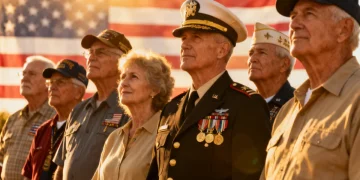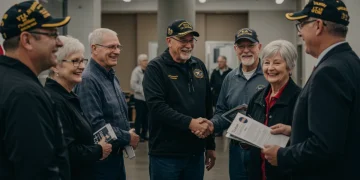Veterans’ benefits: addressing gaps in support services

Veterans’ benefits include healthcare, education funding, disability compensation, and housing assistance, but many veterans face challenges accessing these services due to complex processes and insufficient resources.
Veterans’ benefits are crucial for the well-being of those who served. However, many veterans find themselves navigating a complex landscape of support services that can leave them feeling lost. What can be done to bridge these gaps and ensure our heroes receive the assistance they deserve?
Understanding veterans’ benefits
Understanding veterans’ benefits is essential for those who have served in the military. These benefits can significantly impact their quality of life, providing support in various areas such as health care, education, and housing. It’s crucial to navigate this complex system to take full advantage of what is available.
Types of Veterans’ Benefits
Various benefits are provided to veterans, each serving a specific purpose. Here are some key categories:
- Health care: Access to medical services and treatments through VA hospitals and clinics.
- Education: Funding for education through programs like the GI Bill, which helps veterans pay for college or vocational training.
- Disability compensation: Financial support for veterans with service-related injuries or illnesses.
- Housing assistance: Programs to help veterans find affordable housing.
Each type of benefit comes with its own eligibility requirements and application processes. Understanding these requirements is crucial for veterans looking to access their benefits.
Navigating the Application Process
The application process for veterans’ benefits can be overwhelming. Many veterans are unsure where to start or what documentation is necessary. Fortunately, there are resources available to assist them. Education about the process can empower veterans to apply successfully.
- Gather required documents, such as service records.
- Utilize online portals and local VA offices for guidance.
- Seek assistance from veteran service organizations.
It’s important for veterans to take their time and ensure that they have everything needed before submitting their applications. Being thorough can make a significant difference in the outcome.
In addition to federal benefits, many states offer additional support. Exploring local programs can uncover even more resources available to veterans. Being proactive and informed can lead to increased access to necessary services.
Common gaps in support services
Identifying common gaps in support services for veterans is key to improving their overall experience. Many veterans find that the benefits they need are not always accessible or sufficient. Assessing these gaps helps in understanding how to better serve our heroes.
Accessibility Issues
One major gap is the accessibility of services. Veterans may struggle to reach VA offices or find that services are not available in their area. This lack of accessibility can prevent them from receiving essential care.
- Inadequate local facilities can leave veterans without necessary resources.
- Transportation barriers often hinder their ability to attend appointments.
- Language barriers can complicate communication and understanding of available services.
These issues highlight the need for improved outreach and mobility solutions for veterans.
Insufficient Mental Health Support
Mental health care is another critical area where gaps exist. Many veterans face challenges like PTSD, but access to mental health services is often limited.
- Long wait times for appointments can discourage veterans from seeking help.
- Limited availability of specialized therapists familiar with veterans’ experiences.
- Stigma surrounding mental health can prevent veterans from reaching out for support.
Encouraging a culture of acceptance and providing immediate access to support can make a significant difference.
Furthermore, many veterans report a lack of information about the benefits they are entitled to. This disconnect can lead to unmet needs as they may fail to apply for programs that could significantly improve their lives. Simplifying communication about available services can help bridge this gap.
Finally, social support networks play an essential role in the health and well-being of veterans. Isolation can exacerbate various issues, making it essential to create systems that facilitate connections among veterans and encourage community involvement.
Impact of inadequate support

The impact of inadequate support on veterans is profound and far-reaching. When veterans do not receive the assistance they need, it can lead to numerous negative outcomes in their lives. Understanding these impacts is vital to creating effective solutions.
Emotional Consequences
Many veterans struggle with emotional challenges when support systems fail. Feelings of isolation, anxiety, and depression can intensify. This emotional toll can also contribute to overall mental health deterioration.
- Increased risk of Post-Traumatic Stress Disorder (PTSD).
- Higher likelihood of substance abuse as a coping mechanism.
- Difficulty forming and maintaining relationships.
Such consequences not only affect the veteran but also their families and communities.
Financial Strain
Another significant impact is financial insecurity. Without proper benefits and support, veterans may struggle to secure stable employment or housing. This can lead to:
- Inability to afford healthcare, increasing physical health issues.
- Risk of homelessness due to unstable living conditions.
- Stress and anxiety about financial obligations.
Addressing these financial challenges is crucial for the long-term well-being of veterans.
Moreover, the ripple effects of inadequate support extend beyond individual veterans. Communities also feel the strain when veterans do not receive necessary help. Local organizations may face increased demand for resources, further stretching services thin.
Additionally, the societal perception of veterans can suffer when their needs are overlooked. Programs that fail to support aging veterans can result in a lost opportunity for shared wisdom and mentorship, impacting the next generation.
Strategies to improve benefits
Implementing effective strategies to improve benefits for veterans is essential for addressing gaps in support. By recognizing the needs of veterans, we can develop targeted approaches that ensure they receive the assistance they deserve.
Strengthening Outreach Programs
One key strategy involves enhancing outreach programs to connect veterans with available services. It is crucial to inform them about the benefits they are entitled to.
- Utilize social media and online platforms to spread awareness.
- Host community events to engage veterans in person.
- Partner with local organizations that already serve veterans.
By reaching out proactively, veterans will feel more supported and knowledgeable about their options.
Streamlining Application Processes
Another strategy is to simplify the application processes for benefits. Many veterans may hesitate to apply due to complex forms and requirements. Making these processes more user-friendly can encourage higher participation.
- Reduce paperwork and provide clear instructions.
- Implement online applications that are easy to navigate.
- Offer assistance services to guide veterans through the application.
These efforts can significantly improve access to essential benefits.
Moreover, it is vital to enhance mental health support services. Many veterans face challenges related to mental health and often have difficulty accessing care. Expanding availability and visibility of mental health programs can lead to better outcomes.
Establishing peer support networks can also create a sense of community among veterans, helping them feel less isolated. Encouraging veterans to connect with each other fosters a supportive environment where they can share their experiences.
Finally, advocating for policy changes that prioritize veteran benefits ensures that their needs are addressed at the legislative level. Engaging with stakeholders and lawmakers can directly impact how benefits are structured and delivered.
Resources for veterans seeking assistance
Accessing the right resources for veterans seeking assistance is crucial for improving their quality of life. Various organizations and programs aim to support veterans in different areas, from healthcare to employment.
Government Programs
One of the primary resources available to veterans is government programs designed to offer various forms of support. The Department of Veterans Affairs (VA) provides numerous services to veterans, including:
- Health care: Comprehensive medical care and mental health services.
- Education benefits: Programs like the GI Bill that help cover tuition costs.
- Housing assistance: Support for securing homes or financial help for rent.
These programs are an essential starting point for veterans looking to access assistance.
Nonprofit Organizations
Many nonprofit organizations also offer assistance to veterans. These organizations often fill gaps that government programs may not cover. Some key nonprofits include:
- The American Legion: Provides assistance with claims, partnerships, and social events.
- Veterans of Foreign Wars (VFW): Advocacy and support for veterans’ rights.
- Wounded Warrior Project: Focuses on injury recovery and rehabilitation.
Nonprofits can serve as valuable advocates for veterans and help connect them to vital services.
In addition to traditional resources, online platforms have emerged to assist veterans. Websites and forums allow veterans to share experiences and find helpful information easily. For instance, sites dedicated to veteran transitions offer tools and insights for career advancement in civilian life.
Support groups also play a crucial role. These groups provide a space for veterans to connect with one another, share their stories, and receive emotional support. Participating in these groups can foster a sense of belonging and understanding among veterans.
FAQ – Frequently Asked Questions about Veterans’ Benefits
What are the main types of veterans’ benefits available?
The main types of benefits include healthcare services, education funding through programs like the GI Bill, disability compensation, and housing assistance.
How can veterans apply for benefits?
Veterans can apply for benefits through the Department of Veterans Affairs (VA) website, local VA offices, or by contacting veteran service organizations for assistance.
What challenges do veterans face in accessing support services?
Veterans often face challenges such as long wait times, complex application processes, lack of information, and insufficient mental health resources.
How can communities support veterans better?
Communities can support veterans by enhancing outreach programs, simplifying processes for accessing benefits, providing mental health support, and fostering connections among veterans.






